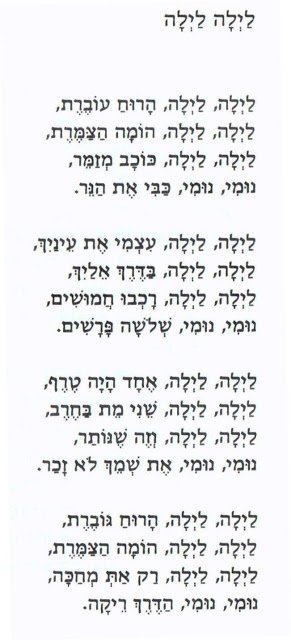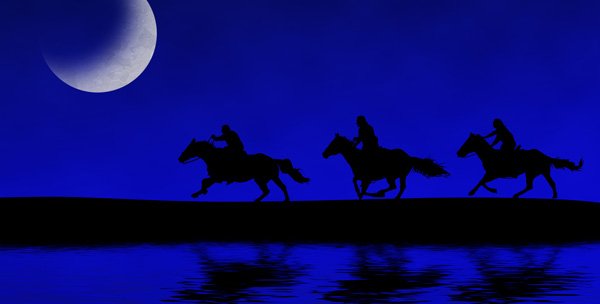When I was a teenager I enjoyed translating songs from English to Hebrew, my first language.
Now, more than a few years later, I’d like to attempt doing the same thing in reverse.
While some people might prefer listening to contemporary music or the music they grew up on, I also enjoy listening to songs written (and sometimes recorded) way before my time.
These “oldies” can really move me, sometimes to the verge of tears.
Tomorrow I’m going to a sing-along evening, dedicated to Israeli women: songwriters, performers, singing with women, for women, about women. I’m really looking forward to it, and wanted to share some of the things in life that I find empowering, so…
Happy Women’s Day!

The song is called in Hebrew “Layla Layla” (a repetition of the word “night”). It was written by Natan Alterman and composed by Mordechai Zeira around the 40’s.
The song is written as lullaby. A twisted lullaby. I think it’s best you read it first and we’ll get to my unprofessional analysis later.
To my hebrew speaking and hebrew enthusiast friends, this is the original version:

Without further ado, this is my translation. I did my best to maintain the feel of the song so it can be sung in English with the original melody:
Layla Layla
Dead of night, a gentle breeze,
Dead of night, the stirring trees,
Dead of night, a lone star will weep,
Put out the candle, fall into sleep.
Put out the candle, fall into sleep.
Layla, Layla,
Put out the candle, fall into sleep.
Dead of night, please close your eyes,
Dead of night, trailing the line,
Dead of night, armed, they proceed,
Three cavaliers, now fall into sleep.
Three cavaliers, now fall into sleep.
Layla, Layla,
Three cavaliers, now fall into sleep.
Dead of night, first was a prey,
Dead of night, the second one slain,
Dead of night, the third that remaind,
Fall into sleep, he'd forgotten your name.
Fall into sleep, he'd forgotten your name.
Layla, Layla,
Fall into sleep, he'd forgotten your name.
Dead of night, the storm takes over,
Dead of night, the treetop quavers,
Dead of night, to yourself you still hum,
Fall asleep, for no one will come.
Fall asleep, for no one will come.

What does it all mean?
The meaning behind this song was never revealed by the poet, so we can only try and comprehend it ourselves. A small anecdote I’ve read while searching for Alterman's intentions made my smile, and it goes like this:
Though this is one of Zeira’s (composer) most popular creations, he composed this just to stop Alterman from whistling and humming.
Alterman used to frequent the Tel-Aviv coffee shops, humming to himself while writing. Every meeting with Zeira, Alterman was humming this song constantly. In one of those meetings, Zeira snapped at him asking “When will you cease torturing me with this pathetic melody of yours?!”.
Alterman replied- “The day you’d composed me a better one”.
source
My interpretation
In this song I hear a lullaby. Lullabies are usually sung to children, but here I think it’s addressed to a woman. The speaker tries to calm and soothe her (I called her Layla, referring to “Layla” sometimes as a name and sometimes as a “night” in hebrew, though I don’t think it was meant to be that way originally).
The speaker is telling Layla a story of 3 horsemen riding towards her, but none of them arrive. One was devoured, another was killed in a fight or a battle (the original lyrics mentioned a death by sword), and last one survived but never came because he had forgotten her name.
According to other interpretations of the song, tragedies occurring to the knights along the way represent the relations between the man and his surrounding- Death by nature or another force (the knight has no way to prevent it), death by another (the knight chose to fight so death was a foreseeable outcome) and the loss of memory (either with or without intent). The speaker is thought to calm her and assure her that nothing and no one will come to harm her.
In my point of view, Layla is not scared of the horseman (so as fear keeps her from falling asleep), but rather anticipating their arrival. The speaker might be trying to console her, for she keeps on waiting her entire life. Why do I see this as an entire life? I believe that the 3 riders represent 3 stages in life. The first rider that was devoured represents childhood, a stage in life that one is most fragile and vulnerable and can be easily defeated by the forces of nature or some unexpected tragedy.
The second rider that died by sword represents maturity (and perhaps toxic masculinity), a stage in life when we pick our own fights, sometimes with dire outcome.
The third rider that lived but forgot her name represents old age, a time when our mind start to fail us, preventing us from accomplishing the goals we cared so much for when we were younger.
I see it as a song about love, hope, and loss.
Thank you so much for sharing this. I listened to the song on the bus, and had big fat tears pouring down my face. The man sitting opposite me carefully pretended not to see. I cry easily at beautiful things, but still wasn't expecting to have that reaction. I think it might have been the lullaby aspect that brought such feelings of bittersweet nostalgia. A lovely melody made all the more poignant by the translation and backstory you provided. I especially liked the part about the song having been written to stop Alterman from whistling. It certainly is a catchy melody and I was humming it to myself for a while after listening.
When it comes to your interpretation, I like your idea about the three horseman representing three stages of life. However, I have a problem with stories that present the woman as a passive ornament, eternally waiting and never doing anything. Perhaps we could propose an alternative interpretation, that the three horsemen represent aspects of Layla herself, so she is not waiting for a man to come and complete her, but rather to be reunited with parts of herself.
YES! I like your version better, though I doubt that when the song was written in the 40's they wrote about strong independent women.
We came a long way though.
Thank you :)
That is a beautiful verse, and I love your translation.
There are so many songs in Hebrew that contain the word "layla" :)
It reminds me of a conversation I had - online, in a game - with a guy who claimed he'd lived in Israel and been in the army.
"Oh, then you know why I called my character Laylael," I said to him. (I was playing a night elf back then.
"No, why?" he replied.
Then I knew he was lying about having been in the army here. Nobody goes to Israel and stays here more than a few hour without hearing a song with the word "layla" included.
Maybe he just wasn't the sharpest pencil in the box, it happens :P
So glad you enjoyed the translation, it still feels a bit "flat" to me, but when I sing it to the melody it comes back into life (good thing I'm home alone, poor ears... poor cat...).
BTW I love your writing as well, still new to this community and not entirely sure if leaving a reply saying only "You're awesome!!!" is acceptable. So you're awesome. and Britt is a lovely name :)
Aw, that's so sweet of you to say :)
Google translates the Hebrew version of my name with Alliance Queen :D
When we made alliyah, they spelled my first name wrong, actually. On my papers now it says:
ברית
And from what I've learned later, Britt being a foreign name, they should have spelled it
בריט
Thank you again for your nice words (and a good laugh with your 'poor ears... poor cat" remark :D
very nicely done :)